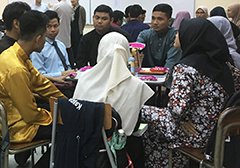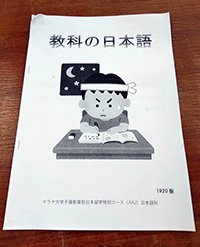Trying to Support Students
Special Preparatory Programme to Japan (RPKJ),
Centre for Foundation Studies in Science, University of Malaya
ISHIMATSU Fumie, OKUNISHI Maiko, and NISHIMURA Hisashi
The Special Preparatory Programme to Japan course (Ambang Asuhan Jepun) (hereinafter “AAJ")at the Centre for Foundation Studies in Science, University of Malaya, is a foundational educational institution for studying abroad in Japan with approx. 150 students and approx. 40 full-time teachers in the University of Malaya, upper secondary school faculty dispatched by the Ministry of Education, Culture, Sports, Science and Technology, and Japanese-Language Specialists dispatched by the Japan Foundation. Although the details will be discussed in the "Institution Information" section, it can be said that this isn’t just a large-scale institution, but one of the leading overseas foundational educational institutions. Over the course of two years, the students and teachers at this large educational institution work together every day for the singular purpose of attending the science and engineering departments at national Japanese universities. Along the way, they wait on the high hurdles of the Examination for Japanese University Admission for International Students (hereinafter "EJU") and then their final exams. This two-year, four-semester course is taught every day from 8:10 to 17:00, with a one-hour lunch break, and follows a well-structured curriculum.
- [Year 1 Students]
-

First-year students listen to senior students with serious expressionIn the first year that students join AAJ, their goal is to acquire basic abilities in the Japanese language and the core subjects. Immediately after enrollment, they begin busy days filled with classes and assignments, and many students have to rush to keep up because they are not accustomed to this kind of pace. Additionally, they are often a bit confused when first starting to learn the Japanese language, and we often hear students lamenting that "I was always at the top of my class in upper secondary school, but things aren't going well here."
At AAJ, we are making a variety of efforts to support students who may have these kinds of anxieties and difficulties. One of these efforts, the "Mentor-Mentee" system (for details, see the FY2019 Japanese-Language Specialist Report), mentor faculty members hold regular interviews with students and provide individual guidance, but there are limits to what we teachers can do. Therefore, in FY2020, we implemented "Hearing Stories from Year 2 Students Meetings" as a new initiative. The purpose of these meetings is to invite older Year 2 students and to then have the Year 1 students listen about their experiences in learning and living, which will then be useful to the Year 1 students in their studies and in their student life over the following two years.
In addition to advice on how to study kanji and listening comprehension and how to spend their week, the older Year 2 students also introduce useful learning apps and Anime. After having already worked hard for one year, the Year 2 students also gave important information and advice such as "Don't compare yourself with other people" and "Build up your self-confidence," which is more grounded than what they’ve heard from teachers. From the Year 1 students, there were impressions such as "I was able to ready myself for when I become a Year 2 student" and "It was easier to talk with the Year 2 students than I expected," so it seems that not only increased their motivation, but they also made a connection with the Year 2 students, who they don't usually interact with, which was a great result.
Each and every student has their own problems. Fortunately, AAJ has numerous role models such as veteran teachers from Malaysia and older students. We hope that, by sharing their worries with someone who is close to them, the Year 1 students will find their own solutions and gain the confidence to become Year 2 students.
- [Year 2 Students]
-

2019/20 Edition Subject-Specific Japanese LanguageOnce they become Year 2 students, preparing for the EJU is one of the pillars of the course. Held in November every year, the EJU is an important exam for students that determines whether or not they can go to the university of their choice. Students have to take not only an exam about the Japanese language, but also exams for science and math subjects that are in the Japanese language, and one of the bottlenecks in taking so is the difficulty of the Japanese language that is used in the examination sentences for science and math subjects. For example, the following type of sentence, with complicated syntax, is not uncommon:
"...when a current of magnitude IB flows through B, the magnitude of the magnetic flux density at P becomes ¼ of the amount it would be when no current flows through B; however, the direction of the magnetic flux density is the same in both cases." (Excerpt from "2011 EJU (2nd session) Exam Questions")Many students have experienced cases where they can understand theories or formulas in either the Malay or English language but cannot understand them in Japanese, not just in exams, but also in regular science and math subject classes. When we asked students about this, approx. 60% of the entire Year 2 class requested that the Japanese-language faculty provide Japanese support for science and math subjects.
Based on this situation, the Japanese-language department created a booklet called "Subject-Specific Japanese Language" that compiles vocabulary and expressions that are frequently used in textbooks and classes for science and math subjects. Additionally, we also took initiatives for newly appointed faculty members in science in math subjects, such as giving lectures on Japanese-language vocabulary and expressions that are easy for students to understand as well as touring science and math classes and then giving specific advice.
It is important to support not just the Japanese-language vocabulary and expressions that is used in Japanese-language classes, but also the Japanese-language vocabulary and expressions that are used in science and math subjects, which will assist in students' understanding of the science and math subjects themselves, and, eventually, will enhance their study abroad life in Japan. We hope that the faculties of the Japanese-language department and the science and math departments will continue to work together and make even more meaningful initiatives.
Source:
"2011 EJU (2nd Session) Exam Questions," Independent Administrative Institution Japan Student Services Organization, p. 78"
References:
Satoko Hamamoto, and Fumie Ishimatsu, Japanese Language Problem in Science Subjects Teaching at RPKJ: A Preliminary report through the questionnaire, Jurnal Bahasa dan Budaya Jepun, Universiti Malaya, 2020
- What We Do Top
- Arts and Cultural Exchange [Culture]
- Japanese-Language Education Overseas [Language]
- Japanese-Language Education Overseas [Language] Top
- Learn Japanese-language
- Teach Japanese-language
- Take Japanese-Language Test
- Know about Japanese-language education abroad
- The Japanese-Language Institute, Urawa
- The Japanese-Language Institute, Kansai
- Japanese-Language Programs for Foreign Specified Skilled Worker Candidates
- Japanese Language Education for Japanese Children Resident Overseas and for the Descendants of Migrants
- Archives
- Japanese Studies and Global Partnerships [Dialogue]
- JF digital collection
- Other Programs / Programs to Commemorate Exchange Year
- Awards and Prizes
- Publications
